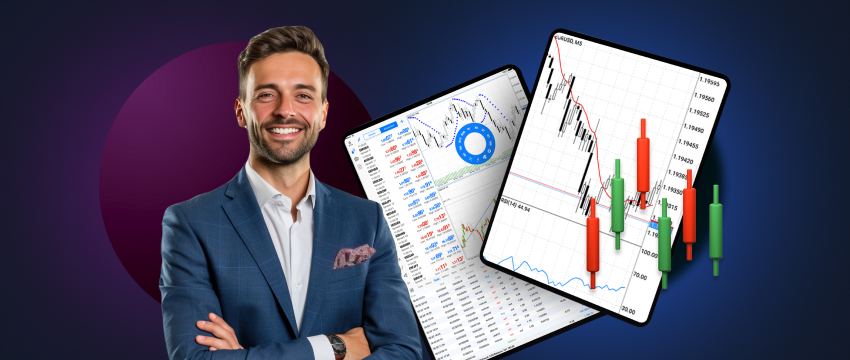Success in trading is different for forex traders. What one forex trader sees as a big win might seem like a small gain to another. In the end, success depends on your financial goals. If you reach them, you could say you’ve succeeded as a forex trader.
But the reality is more complex. Trading is tough, and some believe that 90% to 95% of forex traders lose money, while only 5-10% are able to succeed consistently. So, why is this? What factors explain these numbers for forex traders?
1. Why Forex Traders fail to prepare
Forex trading is not a simple endeavour. It’s not something that can be left to chance or knee jerk reactions. More than anything, it requires having a proper understanding of how the forex market operates, what drives currency prices, and the sessions in which one can trade.
It also requires in-depth knowledge of d'analyse technique et fondamentale, et psychologie du trading. But to acquire this information requires some form of trading related education. It means committing time to engage in ongoing learning to avoid costly mistakes.
2. The Danger of Large Positions for Forex Traders
Forex trading is highly leveraged and thus incredibly risky. Leverage involves using borrowed funds to trade larger positions in the market. The money is borrowed from the broker.
The issue with leverage though is that while it amplifies profits, it can also magnify losses exponentially if the trade performs poorly.
Additionally, the broker, as a means of managing their own risk, may increase the trader’s margin requirement or reduce the leverage ratio.

3. The Risk of Trading Without a Plan for Forex Traders
A trading plan provides focus and discipline. Without it, forex traders are likely to jump from strategy to strategy, with no clear direction.
A trading plan provides the framework, rules and methods of analysis by which the trader will trade.
In the absence of a plan, a trader will instead be driven by their emotions instead of objective data, which most often leads to adverse trading outcomes.
4. Poor trading psychology
The feelings that forex trading evokes play a big role in how trades inevitably end up performing.
The most popular include fear, anxiety, greed, and impatience, which often lead forex investors to make impulsive decisions.
Successful forex investors are those that can handle their emotions and the behaviours they trigger, ensuring their psychological impulses don’t lead to unintended actions that could derail their strategy.
5. Ineffective risk management
Adopting strategic risk management techniques is key should a trader wish to achieve any measure of success.
However, the importance of risk management is often overlooked, especially by those new to trading. They may neglect setting stop-orders or invest too much capital into a single asset or specific position.
In the event that the market moves in an adverse direction, this lack of risk management can result in significant losses, potentially wiping out all their capital.
What then can a forex trader do to increase their chances of success? How can you become one of a small percentage of global traders who manages to succeed more consistently? What are common characteristics of a successful trader?
Staying educated and informed
- One of the tenets of becoming a successful trader is to engage in lifelong learning. Keeping one’s knowledge continuously updated is necessary to be able to manage the challenges of evolving financial markets, including the forex market.
- The internet is packed full of trading related resources but some of the most reliable are those offered by brokers like T4Trade. These educational resources include blogs, videos, podcasts, webinars and Live TV.
- These offer traders’ vital insights, tips, concepts and ideas to boost their skills. Beyond conventional trading related education, a trader must also monitor financial news, geopolitical events, market trends, and technological advancements. By keeping informed, the trader will be in a better position to react to market moving events in real time, mitigating poor trading outcomes.
Maintaining a strong trading psychology
- A successful forex trader understands the powerful influence that emotions can have on trading decisions. They recognize that to trade effectively, it’s essential to remain objective, relying on proper data and analysis rather than emotional impulses.
- Furthermore, they are aware that letting emotions drive trading decisions often leads to negative outcomes. To prevent this, they focus on strengthening their mental resilience. By doing so, they maintain patience and discipline, which helps them avoid unnecessary risks and minimize potential losses.
Prioritise risk management
- Prioritise risk management to safeguard their capital. The ability to protect your money comes from using proper risk management tools. These vary from trader to trader but will usually comprise of stop-loss and take-profit orders, optimal position sizing, and portfolio diversification.
Accept the losses
- Successful forex traders understand that losses are a natural part of trading. However, instead of reacting impulsively, which could lead to even greater losses—such as through revenge trading—they accept these losses and move on.
- Moreover, they demonstrate adaptability. When necessary, they make adjustments to their strategies. This flexibility allows them to stay profitable, even when the market shifts or changes course.

Key Takeaways of Successful Forex Traders
We know the main reasons for why only 5-10% of traders are successful and we’ve established what characteristics they possess. But what are the key takeaways to increase your potential for executing consistent successful trades?
What are some of the things that you can do to work on making more gains:
- Choose the forex trading strategy that best suits your expertise, budget, and temperament. There are so many approaches to trading, from scalping to swing trading, and from day trading to position trading. However, not all strategies are created equal. Each one has its own demands, from time commitment, to risk levels, to volatilities. Ensure you opt for a strategy that aligns with where you are in your trading journey.
- Make sure you get a proper trading related education and consider complementing this learning by signing up for a demo trading account. A demo account will allow you to test a range of strategies, from the simplest to the most complex, and assess outcomes. You will be able to open and close trades using virtual funds in a simulated trading environment and learn how to use technical analysis to make more informed trading decisions.
- Consider keeping a trading journal to track not only the types of trades you are executing and the rationale behind them, but also the behaviours you exhibited when executing those trades. In this way, over time you’ll be able to identify patterns in the way you do things and make tweaks if needed to improve outcomes.
- Develop a trading plan that also integrates your risk management techniques. Ensure the plan aligns with your goals as well as your tolerance for risk. Also ensure that it outlines with specificity the rules by which you’ll trade and the maximum level of risk you’re willing to incur.
- Keep working on your trading psychology to ensure you build strong mental resilience. Be mindful of your emotions and make sure they don’t cloud your judgement. Study as much as you can about trading psychology and the ways to gain better control over your feelings to mitigate emotive trading.

Become T4Trade forex trader
T4Trade est un courtier international populaire qui compte des clients dans le monde entier. Le courtier offre un support client multilingue de premier ordre, 24 heures sur 24 et 5 jours sur 7, des plateformes à la pointe de la technologie et des conditions de trading flexibles.
T4Trade is also a great go-to resource for forex traders looking to learn more about forex trading in a user-friendly way.
Une variété de vidéos, de podcasts, d'eBooks, de webinaires et de vidéos à la demande sont élaborés par des spécialistes internes et s'adressent à tous les types de traders.
T4Trade traders can also choose from a wide range of trading instruments across 6 asset classes, and enjoy flexible leverage, competitive spreads, fast trade execution and seamless deposit and withdrawal options. Traders can also choose from multiple trading accounts that best suit their needs and individual preferences.
CLAUSE DE NON-RESPONSABILITÉ : Ces informations ne sont pas considérées comme des conseils ou des recommandations en matière d'investissement, mais plutôt comme une communication commerciale.





